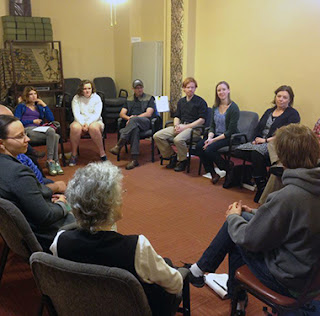My involvement with the Occupy movement this year has given me a lot of insight into the way groups of people unite around a common set of concerns. In my work with Occupy Our Homes, I have seen the power that can be unleashed when a small group of people focus their passion to work together for justice. And in recent months I have spent time studying and testing models of community organizing that could forge our organization into a more effective instrument of empowerment for the 99%.
 This will involve integrating my “religious” concern as a gospel minister and my “social” concern as a budding organizer for economic justice. Looking to Jesus, I see that his “spiritual” mission was never separated from his “social” mission. Spiritual liberty and material emancipation from social and economic bondage have always been two sides of the same coin. I serve the Savior who brings not merely an invisible, “spiritual” rebirth, but a genuine refashioning of the whole human community. As Jesus revealed when he was nailed to a cross for sedition against the Roman state, the gospel is dangerously practical!
This will involve integrating my “religious” concern as a gospel minister and my “social” concern as a budding organizer for economic justice. Looking to Jesus, I see that his “spiritual” mission was never separated from his “social” mission. Spiritual liberty and material emancipation from social and economic bondage have always been two sides of the same coin. I serve the Savior who brings not merely an invisible, “spiritual” rebirth, but a genuine refashioning of the whole human community. As Jesus revealed when he was nailed to a cross for sedition against the Roman state, the gospel is dangerously practical!As a Christian in the United States, these questions challenge me. I see how many of our Christian communities have far too little to do with the living power of Jesus’ gospel. So often, we fail to combine the inward work of spiritual transformation with the outward labor of making the Kingdom of God visible.

